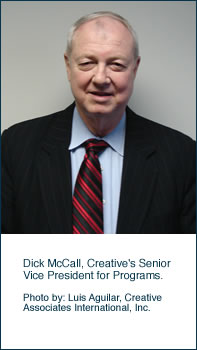[vc_row][largeur vc_column = »1/1″][vc_column_text]
Creative’s Dick McCall: Conflict is Certain for Nation-States without Functioning Institutions
By Alexandra Pratt
[/vc_column_text][/vc_colonne][/vc_row][vc_row][largeur vc_column = »2/3″][vc_column_text] Rebuilding failed states requires a good dose of diplomacy, but without effective institutions to ensure the rule of law and an engaged citizenry, the efforts are doomed to fail, says Dick McCall, Creative’s Senior Vice President for Programs.
Rebuilding failed states requires a good dose of diplomacy, but without effective institutions to ensure the rule of law and an engaged citizenry, the efforts are doomed to fail, says Dick McCall, Creative’s Senior Vice President for Programs.
McCall presented at a “Nation-State Building 101 Workshop” on peacekeeping operations and social reconciliation to personnel from the U.S. Department of Defense and U.S. Army War College Peace Keeping and Stability Operations Institute. The workshop was held this fall at the Center for Naval Analysis in Alexandria, Virginie.
Speaking of post-Cold War challenges, McCall said that ethnic, religious, cultural or nationalistic fault lines have led to the unraveling of “states with very few attributes of nationhood, such as the institutional underpinnings of legitimate governance, the foundation upon which viable nation states are built.”
“What we have failed to understand is that once an authoritarian state collapses or is overthrown, there is no institutional underpinning or coherence in these societies,” McCall said. “In the absence of functioning institutions that reflect a working consensus within these societies, particularly those diverse in their ethnic and sectarian makeup, the potential for re-emergence of violent conflict is a certainty.”
McCall is no stranger to on-the-ground complexities of conflict and reconciliation. He was engaged in the peace process between the warring sides in El Salvador and helped stabilize ethnic differences in the aftermath of genocide in Rwanda.
“In virtually every conflict or post-conflict country in which I have worked, I have found there to be a strong identity at the community level, ethnic or sectarian, but no sense of national identity. The processes of institution building at all levels of society can transcend the divisive nature of localism, or communalism, such as ethnic and sectarian,” McCall said. “Institutions reflect the accepted rules of the game, clearly defining individual rights and responsibilities within the broader community of interests.”[/vc_column_text][/vc_colonne][largeur vc_column = »1/12″][/vc_colonne][largeur vc_column = »1/4″][vc_widget_sidebar sidebar_id= »barre latérale-primaire »][/vc_colonne][/vc_row]